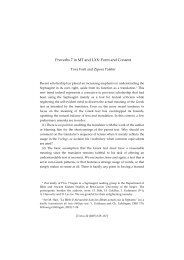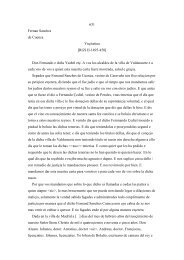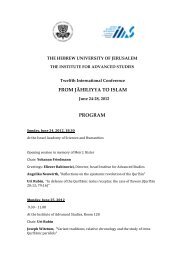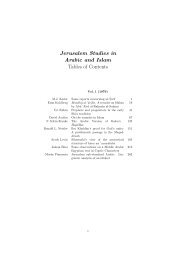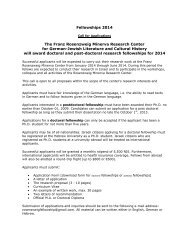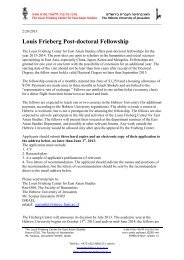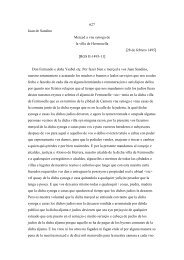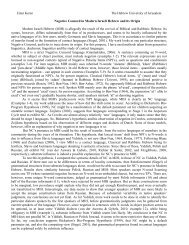Baber Johansen
Baber Johansen
Baber Johansen
You also want an ePaper? Increase the reach of your titles
YUMPU automatically turns print PDFs into web optimized ePapers that Google loves.
49<br />
indicates that the legal validity of the act is not important for the heavenly reward,<br />
whereas the niyya is decisive for it. On p. 23 he lists the acts that are valid without<br />
niyya and can, therefore, also be performed by non-Muslims. But his texts also<br />
shows the tendency to extend the notion of the cultic acts far beyond prayer, fasting,<br />
alms-tax, and pilgrimage through the use of metaphoric language.<br />
67<br />
68<br />
69<br />
70<br />
71<br />
72<br />
73<br />
74<br />
75<br />
76<br />
77<br />
78<br />
79<br />
80<br />
81<br />
NawawÐ, al-MajmÙÝ, vol. I, pp. 362.<br />
Ibid., vol. III, pp. 5-6.<br />
Abū al-BaqÁÞ AyyÙb b. MÙsÁ al-ÍusaynÐ al-KaffawÐ, al-KulliyyÁt. MuÝjam fi l-<br />
muÒÔalaÎÁt wa l-furÙq al-lughawiyya eds. ÝAdnÁn DarwÐsh and MuÎammad al-MaÒrÐ<br />
(Beirut: MuÞassasat al-risÁla, ,1993/1413), p. 583.<br />
Ibn ÝÀbidÐn, Radd al-muÎtÁr ÝalÁ al-durr al-mukhtÁr, vol. I, p. 78, see also pp. 144-<br />
145.<br />
Ibid., vol. I, p. 78.<br />
Joseph Schacht, An Introduction to Islamic Law (Oxford: Oxford University Press,<br />
1964; repr. 1971), p. 208, writes: "As regards the formal character of positive law,<br />
the sociology of law contrasts two extreme cases. One is that of an objective law<br />
which guarantees the subjective right of individuals; such a law is, in the last resort,<br />
the sum total of the personal privileges of all individuals. The opposite case is that of<br />
a law which reduces itself to administration, which is the sum total of particular<br />
commands. Islamic Law belongs to the first type, and that agrees with what the<br />
examination of the structure of Islamic ‘public law’ has shown." Schacht is<br />
definitely right in stressing the importance of subjective, individual rights in Islamic<br />
law. There are also one-sided obligations in Islamic law that one cannot simply<br />
disregard. The cult certainly knows many of them and thus justifies the use of<br />
deontology as an analytical tool, but that cannot go so far as to ignore the many<br />
ways in which Islamic law guarantees individual rights and in which the discussion<br />
of the cult opens perspectives for individual initiatives and a social morality built<br />
upon them.<br />
But see van Ess, Prémices, p. 36.<br />
Helmut Ritter, s.v. "Al-GhazÁlÐ," in The Encyclopaedia of Islam. New Edition, Vol.<br />
II (Leiden and London: Brill and Luzac, 1965), pp. 1038-1042.<br />
George Makdisi, s.v. "Ibn ÝAqÐl, Abu l-WafÁÞ," in The Encyclopaedia of Islam. New<br />
Edition, Vol. III, pp. 698-700.<br />
AbÙ ÍÁmid MuÎammad ibn MuÎammad al-GhazÁlÐ, Al-MustaÒfÁ min Ýilm al-uÒÙl<br />
(Cairo: MaÔbaÝat MuÎammad, 1356/1937), p. 3.<br />
Ibid., p. 4. I choose this translation of akwÁn following van Ess, Theologie und<br />
Geschichte, vol. IV, pp. 128-129.<br />
GhazÁlÐ, MustaÒfÁ, p. 4.<br />
Ibid., p.4.<br />
Ibid., p.5.<br />
Ibn ÝAqÐl, al-WÁÃiÎ, vol. I, p. 2.




